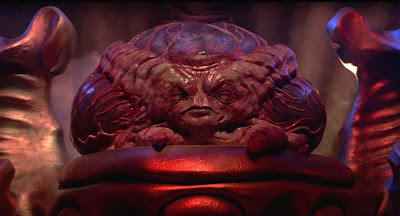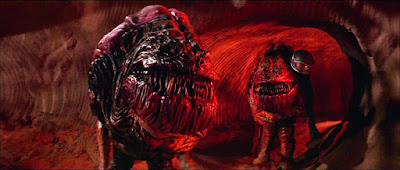In retrospect, Tobe Hooper probably should have walked away from Cannon Films and Menahem Golan and Yoram Globus after the debacle of Lifeforce. Hooper still had cache after directing Poltergeist for Steven Spielberg, and the lingering reputation from the The Texas Chain Saw Massacre, but his three pictures for Cannon were career killers. Cannon had a reputation for producing schlock while over-promising on the quality of their films and one has to wonder if that had something to do with the reception for the remake for Invaders from Mars (1986). There was a staggering amount of talent associated with this film, including Hooper, cinematographer Daniel Pearl, screenwriter Dan O'Bannon, special effects masters John Dykstra and Stan Winston, and a cast of familiar faces, even if there were no big, big stars. And the film itself? It's better than I remembered it being. Mind you, I didn't really understand this film when I first saw it when it was in movie theaters. I hadn't seen the original film as a kid, so I didn't feel its wavelength as a children's movie. Nor did I recognize how thoroughly it reconstructed the original film for the 1980s. I did have the feeling that it was a poisoned fruit from a poisoned tree, which is perhaps not really true.
The film opens with a father and son watching a meteor shower. The boy, David Gardner, wants to become an astronomer, and his dad encourages him. His mom, on the other hand, is a mom and shoos James off to bed because it's a school night. As he tries to fall asleep, he sees a bright light coming from behind his house and rushes to the window to see a vast spaceship landing behind the hill. His parents are skeptical when he tells them, but his dad promises to check it out in the morning. When he comes down for breakfast, his dad has done so, but he's...different now. He offers to take David to the site, but his mom--being a mom again--packs him onto the school bus. As the bus pulls away, his dad instead goes for a walk with his mom. When he comes home from school, mom, too, is...different. At school, David is tormented by the seemingly wicked biology teacher, Mrs. McKeltch, who sends David to the principal's office after an altercation with some other students in which the frogs they are due to dissect are thrown at each other. It's David who is punished, even though he's mostly innocent. At home, David calls the police to come investigate his parents and the mysterious doings on the other side of Copper Hill, they seem credulous enough, but when they return from the site, they too have changed. The following day, David's friend, Heather, also seems...different, and Mrs. Ketch's animosity toward David seems to have ramped up to an active vendetta. The people who have changed all have a wound on the back of their necks, and Mrs. McKeltch has a bandage there. Is she in on it? This culminates in David witnessing Mrs. McKeltch eating one of the dissection frogs. He unloads all of his terror on the school nurse, Linda, who believes enough of his story to aid him in escaping Mrs. McKeltch and Heather. Unfortunately, the vehicle he hides in is driven by Mrs. McKeltch, who he follows to a cave in Copper Hill, where he finds that the alien ship he witnessed is very real, and the alien invaders are inserting implants through the necks of people to control them. He runs to Linda, who agrees to go with him to find help. They drive to the nearby military base, where David's father works, to talk to the general. Rather than disbelieve them, he is convinced when two of his scientists drop dead from implants in their necks after failing to sabotage a rocket to Mars. After a more spectacular attempt with a truck full of explosives succeeds in destroying the rocket, General Wilson is fully behind David, and assembles a force to investigate Copper Hill, where his men enter the ship that is concealed there. The battle with the Martians is on...
One of the reasons that the original Invaders from Mars persists in the minds of the baby boomers who saw it as kids is that it is a film that is calibrated precisely to terrify children. It centers on a little boy whose world is upended by the Martians, and it strips away the institutions that a child relies on to have a place in the world. Parents, teachers, the police? All of them are co-opted. It adds to this mix by suggesting that the kid himself is being specifically targeted by these figures who he would otherwise rely upon. The thing is, to an adult eye? It's not a very good film. It has stilted acting and a plot that follows a child's logic. If one does not come to it as a child, it is unlikely to snare the viewer in its web of paranoia. It was directed by the great production designer William Cameron Menzies though, so it looks great. In choosing to follow the outlines of the original film in a more or less faithful manner, the 1986 film winds up replicating this flaw. And, indeed, kids who saw the remake with no prior knowledge of the original apparently respond to it in like fashion. My problem with it is that I was a grown adult off at college when I first saw this film, but I was green enough about movies that I didn't really "get" that it was a kids film. Part of this is the production. It LAVISHES then-current production design and special effects on its last act in a way that aligns it with the sci-fi horror movies of the 1980s. It doesn't look like a kids' movie in these scenes, and the device that the Martians use to install the control implants is very much not something one expects in such a film. As I say, I hadn't seen the original at the time, so I missed most of the in-jokes, too. I think the only one that lit up my brain was the fact that the town where it was set is "Santa Mira", which unfortunately calls to mind a much better film.
Updating the look of the film for the special effects generation of the 80s also carries with it a dissonance, because what's on screen is state of the art, but it's also patently ridiculous. The Martian drones are lovingly manufactured and puppeted by Stan Winston and his team, but they're all mouth, with an evil grin. Their closest contemporary relative was the plant in the remake of Little Shop of Horrors from the same year. That film was obviously played for laughs. This one is more droll, save perhaps the scene where the Martians eat Mrs. McKeltch. This surely panders to the desires of schoolchildren everywhere when confronted by a particularly stern teacher. The original version of the Martian Supreme Intelligence is similarly ridiculous, but the one in the remake is not. There's a schism between the drones and this character with which the film can't really reckon. One other flaw shared by the remake is the quality of its central performance. While Hunter Carson is significantly better than Jimmy Hunt (who appears as the police chief in this film), he's not a lot better. More vexing is the way the adult cast performs. The controlled adults seem like an exaggeration of emotionless automatons save for Louise Fletcher who goes all Wicked Witch of the West on Mrs. McKeltch, while even some of the uncontrolled adults seem like they're pitching their performances toward children. Which, of course, they are.
I had a pretty bad time at Invaders from Mars when it was in theaters. I genuinely hated it at the time. Part of this is because it promises a film by Tobe Hooper and delivers a film that has none of the ferocity of the director's best work. I think I might have called it bait and switch at the time. It works better decades later with some knowledge of what it's actually trying to do, and with some broader knowledge of Hooper's tendencies as a director. The domestic scenes at the start of the film jibe with the techniques Hooper employed in Poltergeist and The Funhouse, in which he presents a bland, bourgeois American household and picks it apart when the forces of darkness come a-knocking. This construction is arguably more influential on the subsequent horror genre--though probably not through THIS movie--as its more conservative practitioners have provided the world with nuclear family after nuclear family under threat in this century. They mostly follow Hooper's template. What this film lacks compared to Hooper's other examinations of this trope is the economic dimension. This family is affluent and its stressors are not from money. This isn't the Sawyer family, nor even the Freelings from Poltergeist. There IS a characteristic revulsion toward the eating of meat in this film, both in the scene of Laraine Newman eating raw hamburger, and in the frog scene. This marks the film as one of Hooper's even without the requisite carnage, if you'll pardon the pun. So does the bleakness of its ending. This is inherited from the original film and like that one, this is a Möbius strip of a film which sends the audience away with the knowledge that nothing is all right, that nothing has restored the structure on which society stands. This doesn't provide the relief one finds at the end of Poltergeist, but instead suggests a world out of joint that will continue without end. It may not have the punch of Leatherface's sunrise dance, but it has similar aims.
So it's a handsome, flawed film. I'm not going to say I like it, but rather that I like it better than I did. It's hard to shake that initial impression from all those years ago and the film itself doesn't help that process much. But I didn't hate it this time. That's a step up.

This blog is supported on Patreon by wonderful subscribers. If you like what I do, please consider pledging your own support. It means the world to me.






















No comments:
Post a Comment